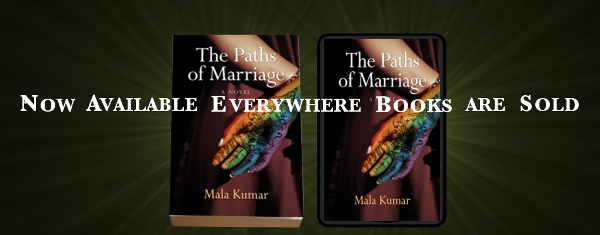 This is the final post of the series that examines topics from the perspective of the characters in the upcoming novel, The Paths of Marriage which will be for sale starting 1 October 2014.
This is the final post of the series that examines topics from the perspective of the characters in the upcoming novel, The Paths of Marriage which will be for sale starting 1 October 2014.
“Pacing Oneself was not an Immigrant Option” is written from the point of view of the character, Lakshmi Deva.
When I first came to America in the 1960s, I noticed many people of this country used an expression that we in India did not know:
Hurry up and wait.
As an immigrant, I found it very strange this idea of ‘pacing oneself’. In India, our required method of thinking is:
Hurry up and push the slow people out of the way.
Though it is getting much better, in the India in which I grew up there was not enough food, not enough jobs, not enough teachers, infrastructure, or time to ‘pace oneself’. Competition was the name of our lives, and we pushed ourselves to the brink of death on a daily basis to survive.
As you will read (and you really should, the novel is quite good) in my story, this need to hurry up and push the slow people out of the way resulted in me immigrating to the United States in 1961 with my precious baby, Pooja. My husband, Shankar, had come the previous year. We came to the United States to build a better life, though we knew the terms of Shankar’s work visa would require us to return to India after a few years. Having battled a very difficult life in India, I knew returning was not an option. We would simply push our way through as we had been taught to do at home.
What we did not understand at the time was a highly inconvenient measure in American immigration policy known as the National Origins Formula (NOF). This NOF essentially said that because we were not from Europe or other “Western” countries, we were not eligible to stay in America. The fact that Shankar got the initial visa was already a miracle.
My children always complained about growing up in a ‘rinky dink’ town of West Virginia. What they could not understand, what they could perhaps never understand, is that ‘rinky dink’ town in West Virginia saved our lives. Shankar’s profession as a doctor and that underprivileged town in West Virginia was one of a miniscule set of combinations that allowed us to continually live in the United States at that time. Yes, it was often harsh living there as brown immigrants, but it was a far kinder and just home for my children than if we had been forced back to my old life in India. For that, I will always be grateful.
One quiet, sunny spring day, my Pooja – then 7 – was trying to convince me that watching the American television was a good idea despite the lovely weather.
“Moooom! Press that button, turn this dial, then boom!”
My Pooja was always very good with technology. She brought up one of the three channels we had, and sat my younger daughter and me down to watch her cartoons. I did not appreciate she wanted to waste her summer watching the television instead of sitting outside and reading textbooks. As I got up to turn off the contraption, a breaking news story came on:
“The Hart-Cellar Act, also known as the Immigration Act of 1965 goes into effect next week. The Act abolishes the National Origins Formula,” the news anchor said.
“What!?” I screamed.
“Hey! Where are my cartoons?” Pooja complained.
When I spoke to our immigration lawyer in Philadelphia, I learned the Immigration Act of 1965 threw out the idea of completely basing immigration allowances to the United States on where someone is from. Instead, the skills of the person became the primary determinant. Visa applications starting in 1965 were considered under this new law.
“As a doctor, your husband would have been admitted with your family with no requirement to go back to India, no problem. You could have gone anywhere you wanted,” our lawyer said.
Shankar and I were so young and so unprepared when we came to America. We had no choice; if we did not hurry up and push the slow people out of the way, I could have easily died in my old world. The irony of our lives is that because we had to hurry up, we first landed on American soil just five years before the entire face of immigration policy was rewritten in our favor. Just five years!
Our life happened as it did and there is no use in wishing otherwise. Still, I can only imagine what would have happened if our India let us ‘pace ourselves.’ Surely, our story would not be what it is today.
To keep updated on new character essay posts on Crasstalk and to find out more about The Paths of Marriage, visit the website and sign up for the newsletter!
Buy the book on 1 October 2014. This is one powerful story you will never forget.
The complete The Paths of Marriage character series:
Deepa Deva – Implicit Outings on Facebook
Pooja Deva – The Narrative of Marriage
Lakshmi Deva – Pacing Oneself was not an Immigrant Option
Audrey Girard – How to Start a Conversation, American vs France
Anand Suresh – We all Spoke English, just not the Same Language
Alpa Deva – A Straight Coming Out Story